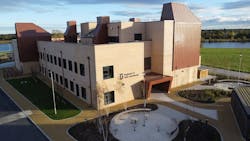Siemens Completes 200 kW Solar Farm at the University of York to Power New Institute for Safe Autonomy
Siemens has completed a 200 kW solar farm for the University of York located at the University’s new Institute for Safe Autonomy as part of a $1.9 million research project funded through the UK Research Partnership Investment Fund (UKRPIF).
The project will enhance the Institute’s research capabilities to develop and test robots and other autonomous systems for the inspection and maintenance of solar arrays. It is one of the nine projects expected to improve environmental sustainability due to $23.8 million of funding from the UKRPIF.
The solar farm will not only create a living lab for the Institute to give insight to landowners and operators of solar farms’ role in integrating robotic technology in the field but also enable the Institute to become net zero for energy by 2025, thereby generating power for more than 80% of the building’s 600 kWh expected daily use.
The farm covers more than 1,400 square meters, consisting of various panel configurations including static ground installations and a sun-tracking array. Some of the solar panels are also mounted onto the side of the Institute’s building and its rooftop as building-integrated photovoltaics to achieve a wide range of installation positions.
The solar arrays were installed by LYNX Sustainable Solutions.
Siemens’ team supported the installation through consultancy services, helping to design, commission, and optimize the solar arrays for the robotic technology being used as part of the Institute’s research, in addition to setting up a data collection system for the panels that will support research projects at the Institute.
“Robotics, autonomous systems, and AI have the potential to transform the way we live, travel and work in the future. Integrating them with the production of renewable energy will ultimately play a key role in the journey towards net zero,” said Professor Miles Elsden, Director of the Institute for Safe Autonomy.
About the Author
EnergyTech Staff
Rod Walton is senior editor for EnergyTech.com. He has spent 17 years covering the energy industry as a newspaper and trade journalist.
Walton formerly was energy writer and business editor at the Tulsa World. Later, he spent six years covering the electricity power sector for Pennwell and Clarion Events. He joined Endeavor and EnergyTech in November 2021.
He can be reached at [email protected].
EnergyTech is focused on the mission critical and large-scale energy users and their sustainability and resiliency goals. These include the commercial and industrial sectors, as well as the military, universities, data centers and microgrids.
Many large-scale energy users such as Fortune 500 companies, and mission-critical users such as military bases, universities, healthcare facilities, public safety and data centers, shifting their energy priorities to reach net-zero carbon goals within the coming decades. These include plans for renewable energy power purchase agreements, but also on-site resiliency projects such as microgrids, combined heat and power, rooftop solar, energy storage, digitalization and building efficiency upgrades.
